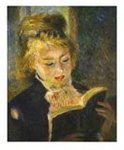I've started a new Yahoo reading group that will be reading literature in translation. Anyone interested in joining me? It's only 5 books a year!
The first three books are:
September 1: We by Yvgeny Zamyatin (Russian, 232 pp.)
November 1: Veronika Decides to Die by Paolo Coelo (Portuguese, 240 pp.)
February 1: Independent People by Halldor Laxness (Icelandic, 512 pp.) We by Yvgeny Zamyatin
We by Yvgeny Zamyatin
In the One State of the great Benefactor, there are no individuals, only numbers. Life is an ongoing process of mathematical precision, a perfectly balanced equation. Primitive passions and instincts have been subdued. Even nature has been defeated, banished behind the Green Wall. But one frontier remains: outer space. Now, with the creation of the spaceship Integral, that frontier -- and whatever alien species are to be found there -- will be subjugated to the beneficent yoke of reason.
One number, D-503, chief architect of the Integral, decides to record his thoughts in the final days before the launch for the benefit of less advanced societies. But a chance meeting with the beautiful 1-330 results in an unexpected discovery that threatens everything D-503 believes about himself and the One State. The discovery -- or rediscovery -- of inner space...and that disease the ancients called the soul.
A page-turning SF adventure, a masterpiece of wit and black humor that accurately predicted the horrors of Stalinism, We is the classic dystopian novel. Its message of hope and warning is as timely at the end of the twentieth century as it was at the beginning.  Veronika Decides to Die
Veronika Decides to Die
Twenty-three-year-old Veronika seems to have everything she could wish for. She goes to popular night spots, dates attractive men, and has a caring family. Yet something is lacking in her life. So on the morning of November 11, 1997, Veronika decides to die.
After she awakens from an overdose, Veronika finds she has only days to live. The story follows Veronika through those intense days as, to her own surprise, she finds herself drawn into the enclosed world of the local hospital she is staying in. In this heightened state she experiences things she has never allowed herself to feel: hatred, fear, curiosity, love, and sexual awakening. Gradually she discovers that every second of her existence is a choice between living and dying. Paulo Coelho's Veronika Decides to Die, based on his own moving personal experience, is about people who do not fit into patterns society considers to be normal. It is about madness and the need to find an alternative way of living for people who face prejudices because they think in a different way. In Veronika Decides to Die, Paulo Coelho invites the reader to discover the world that lies outside the routine and addresses the fundamental question asked by millions: what am I doing here today?" and "why do I go on living?" Independent People by Halldor Laxness
Independent People by Halldor Laxness
From Publishers Weekly
Originally published in 1946 and out of print for decades, this book by the Nobel Prize-winning Icelandic author is a huge, skaldic treat filled with satire, humor, pathos, cold weather and sheep. Gudbjartur Jonsson becomes Bjartur of Summerhouses when, after 18 years of service to the Bailiff of Myri, he is able to buy his own croft. Summerhouses is probably haunted and is certainly unprepossessing, but Bjartur is a stubborn, leathery old (whatever his age) coot, and he soon has his new bride and few head of sheep installed in a sod house. When his wife dies cold and alone giving birth to the daughter of the Bailiff's son, Bjartur takes the child on almost as another test of his independence. Bjartur survives another wife, three sons that lived and several dead ones, all with his "armour of scepticism," which "endowed him with greater moral fortitude than that possessed by the other men." Through hard times (in the guises of worms and a cow that threaten his precious sheep), Bjartur maintains his ferocious and self-destructive independence, one aimed not so much at bettering his condition as being able to tell his former employer where to get off. Laxness is merciless with the hypocrisy of the upper classes, as exemplified by the Bailiff's poetess wife, who applauds the simple life of poor country people, or the Bailiff's son, whose social-welfare schemes help him but undermine the crofters. Laxness is not easy on Bjartur, who is bloody-minded in the extreme, but he is tender enough to compose a poem to his exiled adoptive daughter, and bold enough to engrave a simple marker in honor of the misunderstood ghoul who has haunted his farm and family. He's a figure that Snorri Sturluson would have recognized.
About Me
Blog Archive
- July 2008 (1)
- July 2007 (41)
- June 2007 (20)
- May 2007 (16)
- April 2007 (28)
- March 2007 (32)
- February 2007 (24)
- January 2007 (6)

3 comments:
I'll definitely join in for Independent People and Veronika Decides to Die, both books are on my Reading Across borders challenge this year.
I don't know HOW you do it!! With all the challenges and Yahoo groups, I'm amazed. And you are just so tempting!! I have had Veronika Decides to Die on my list ever since I read the Alchemist!
I'd love to have both of you in the group!!!
Post a Comment